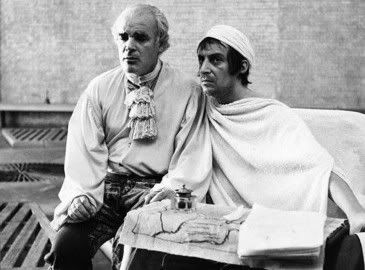
Patrick Magee as Sade and Ian Richardson as Marat
... that’s how you feel when the idols of your youth disappear. Gods should not be allowed to die.
The actor Ian Richardson died this morning, in his sleep.
I am in shock.
The Persecution and Assassination of Jean-Paul Marat as performed by the inmates of the Asylum of Charenton under the direction of the Marquis de Sade (at the time of its release in the ’60s, people joked, 'I haven't seen the film, but I've read the title') or Marat/Sade, directed by Peter Brook, changed the course of my life – literally. I owe my love of the theatre to that film and it's because of it (and more especially because of Ian Richardson, who played Marat) that I stopped studying psychology at the Sorbonne and took up English instead. The first time I saw it, I stayed for two performances and nearly missed a train I had to catch that evening.
I will write more later.
Update (10 February): By the time the world became aware of him, Ian Richardson was already past his prime. Yes, he was wonderful as Francis Urquhart in House of Cards. Absolutely wonderful, but...
I was there. I was there, night after night, matinee after matinee, in the dark and womblike auditorium of the Royal Shakespeare Theatre, standing at the back of the stalls, leaning on my railing, lapping it all up: the scenery, the costumes, the music, the verse, the emotions. I was there when Ian Richardson was a god and he knew it and he had the audience hanging on his every inflection, when his voice soared... ah!...
Don’t just take my word for it. Every review of every play he was in mentioned the voice, but this is what Roger Lewis says in his book Stage People:
He sings his sentences, his voice swooping from a bellow to a whisper, from a hoot to a silence. Richardson’s voice is his instrument; he is conscious of it and proud of it; he plays upon it and with it. He can draw out a single word into an alarming stutter of syllables, like a libretto fragmented and reproduced under the stave; he’ll then speed ahead, putting a girdle around a paragraph in four seconds.It was the voice above all. But also the poise, the stillness. And the wit. And the sense of danger too. There, on the stage, not preserved in aspic for posterity.
He’s gone and hardly anyone is mentioning Shakespeare. My 20-year-old self would never have believed it. It makes me very sad now.
I knew Ian Richardson – a tiny little bit. I lived in his Stratford house, with two other girls, for the best part of 1974. He wasn’t there; he was renting it out to us. The house was very cold; my room was the coldest of all, but I didn’t care. There was a throne from some past RSC production on the patio; Marat’s tin bath was rusting at the bottom of the garden; his acting editions of Penguin Shakespeare were sitting on the shelves in the living room (they got thrown away a little later and I now wish I had ‘stolen’ a couple of them, but I didn’t dare at the time). Fans used to walk past the house, stop and point at it. Told you he was a star.
He used to scare me to death, from time to time, by turning up unannounced (always accompanied by his wife, who usually remained silent) and demand to know why the lawn hadn’t been mown (the neighbours were always complaining). I’ve heard Marat and Francis Urquhart and Angelo and Richard II yell my name from the bottom of the stairs and then discuss mundane things. It was wonderful.
Later that year, when I was working at the Aldwych Theatre (dressing the tallest actor in the company, of course – some kind of hazing I believe it was), we used to pass each other backstage every night and exchange no more than a smile, except once, when he said something so bitchy about someone we both knew that I was in hysterics for the rest of the evening. That’s also how I want to remember him: rather camp and mercurial.
I visited eBay last night: lots of people are trying to cash in on Ian’s death and flogging photos and letters signed by him. I have a few of those, among them a very grumpy letter: I had reproached him for wasting his time on rubbishy stuff (it must have been before House of Cards), and he had written back defending his choices. I wasn’t convinced, and I was right: a few years later, he said in an interview that he bitterly regretted not doing stage work any longer, and Shakespeare in particular.
I also have the waistcoat he wore as the Government Inspector at the Old Vic (I didn’t steal it; I bought it for a few pounds at a charity auction). No, you won’t find it listed on eBay either – not now, not at any time in the future.
What else can I say? I saw him recently at the National Theatre, in a play, and also talking about his career (I went mainly because my younger self would not have missed it and I owed it to her). He was just as entertaining as ever. He said he would probably never act on the stage again (a premonition?) and his one regret was that he’d never got a chance to tackle King Lear. He sounded happy, though.
There’s no doubt about it: it was the voice that did it.
Update: To hear the voice that mesmerized me 40 years ago, click here
